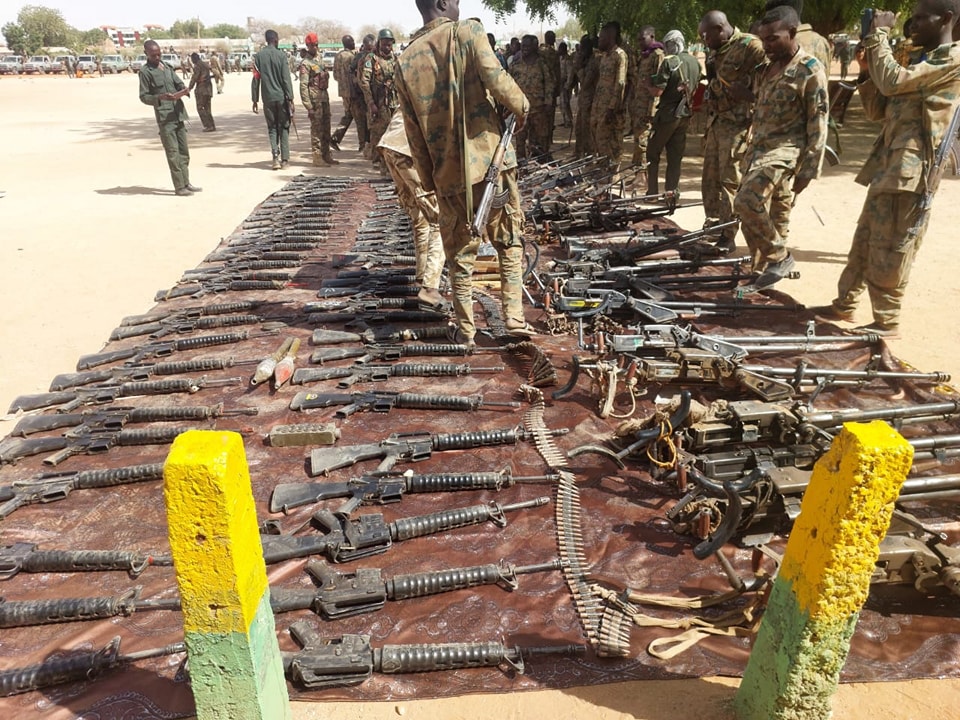Sudan capital: Ramadan without water or electricity as battles continue

Sudanese army soldiers show weapons allegedly seized from the RSF paramilitaries in Khartoum North, March 18 (File photo: SAF FB page)
The Sudanese Armed Forces (SAF) resumed its shelling of El Kadaro in Khartoum North on Saturday. The area of the Signal Corps base witnessed fierce fighting. Many areas in Khartoum state lack drinking water and electricity. Khartoum North and Khartoum remain deprived of communication networks.
On Saturday, the Sudanese army renewed its heavy artillery shelling in northern Omdurman on targets in El Kadaro in Khartoum North on Saturday. SAF on its Facebook page posted videos of Special Task Forces carrying out “qualitative operations along RSF supply lines” in the military area of El Kadaro.
The area of the Signal Corps base in the southern part of Khartoum North witnessed fierce fighting between the SAF and the Rapid Support Forces (RSF) on Saturday.
In the evening, both sides claimed victory over the other. The RSF said on its account on X that they killed dozens of army troops, destroyed military vehicles, and shot down a drone. The SAF commented on its Facebook page by saying they inflicted “heavy casualties” to the RSF and seized a large number of weapons from fleeing paramilitaries.
Today, the army spokesperson stated on Facebook that the “general situation is stable except for limited skirmishes in the vicinity of the command area [the buildings of the SAF General Command] and the airport [in Khartoum]”.
He spoke about the “beginning of the second phase at dawn today concerning the operation of securing the areas surrounding the General Command arriving to the centre of Khartoum”.
The army spokesperson also reported that “international parties proposed a humanitarian truce for a period of 24 hours, which was approved by the SAF, but the rebel militia did not abide by it and did not stop fighting in the vicinity of the command and the airport”.
The Sudan War Monitor (SWM) yesterday commented on the SAF offensive in Khartoum North, “while on the Omdurman front the army continued to make gains, pushing west into Ombadda”.
Now that the SAF have accomplished their principal objectives in Omdurman, they are likely to turn their attention to neighbouring Khartoum North, SWM stated, noting that with the exception of two pockets of territory, most of the city is under RSF control.
SWM said that “there is some evidence that SAF special forces already have operated across the Nile”.
Lower prices
Communications provider Zain announced a gradual return of its services to Omdurman. The Sudani network returned in the city last week. Sudani reported its return to El Managil in El Gezira on Saturday.
The resistance committees of the El Fitihab neighbourhood reported lower prices on the markets, the availability of food and medicine, and ease of traffic after the SAF managed to end the siege of the RSF on the area a week ago. The provision of water and electricity is still weak.
“The price of a kilo of flour reached SDG30,000 during the RSF siege, and now plummeted to SDF 1,600,” they stated on Facebook.
“At the same time, after the army took control, El Fitihab is suffering from power and water cuts, while the RSF’s indiscriminate shelling of the area is putting the residents at increased risk.”
Drinking Nile water
Large parts of Khartoum, Khartoum North (Khartoum Bahri) and El Gezira remain deprived of any form of telecommunication since early February, especially in areas controlled by the RSF.
The Khartoum North Emergency Room reported yesterday that the suffering of the people in the city worsened with the advent of the fasting month, “in light of the high temperatures, the interruption of water supply and instability of power provision, and the continued communications and Internet blackout, which led to the suspension of all banking services”.
The electricity outages in the city forced the people again to draw drinking water from the River Nile, which is “difficult and dangerous”, because of the fighting and marauding RSF troops.
The emergency room of the densely populated El Haj Yousef neighbourhoods in East Nile said that since the communications networks were cut off in early February, people resorted to Starlink, “though it is very expensive”.
The Wadi El Akhdar Resistance Committees in East Nile said that the water and electricity provision stopped five days ago. “People also suffer from a lack of cash and the crazy rise in food prices.”
The committees said that community kitchens in the neighbourhood “are providing food again to hundreds of families”.
Depending on solar energy
Large parts of El Nahda (formerly Ingaz) neighbourhood, in what is called the Southern Belt of Khartoum, are also experiencing a severe water crisis and power cuts.
People in the neighbourhood that has been the scene of heavy SAF-RSF battles in the past months, are now depending on “a good man in the neighbourhood, who uses solar energy to provide water,” Mohamed Abdallah, spokesperson for the Southern Belt Emergency Rooms said in a video message.











 and then
and then